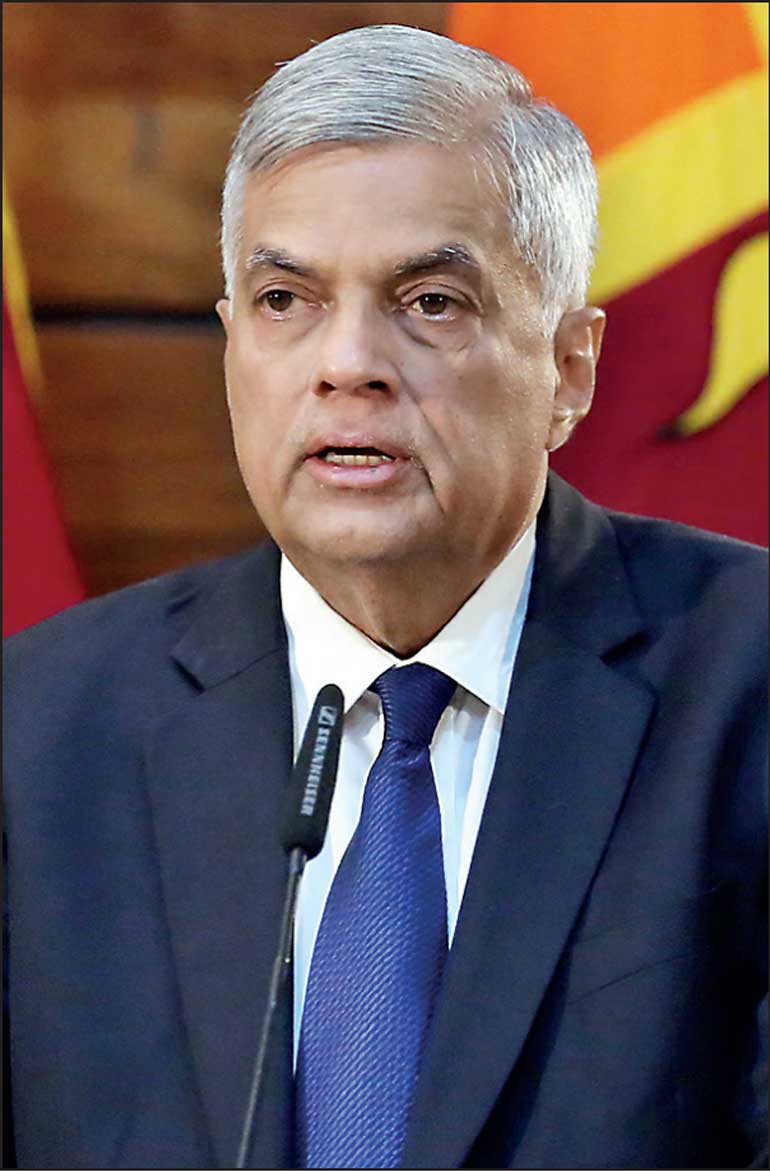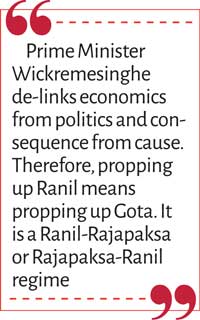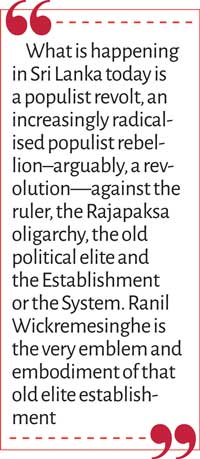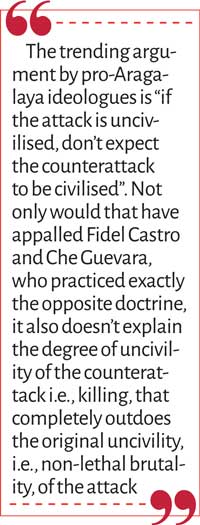Wednesday Feb 18, 2026
Wednesday Feb 18, 2026
Thursday, 19 May 2022 00:20 - - {{hitsCtrl.values.hits}}

Prime Minister Ranil Wickremesinghe
Talk about disappearances. Like a conjurer, Prime Minister Ranil Wickremesinghe, with his rhetoric, re-definitions and re-direction, has made the ‘Gota Go Home’ slogan submerge. He replaces the ‘Gota Go Home’ Aragalaya (‘Struggle’) with economic imperatives and thereby displaces the epicentre of the struggle. Some Opposition parties and some within Opposition parties are following the PM’s cue like children following the Pied Piper of Hamelin.
Home’ Aragalaya (‘Struggle’) with economic imperatives and thereby displaces the epicentre of the struggle. Some Opposition parties and some within Opposition parties are following the PM’s cue like children following the Pied Piper of Hamelin.
His ‘construct’ is a diversion away from the truth of the economic crisis itself. Al Jazeera 18 May has this headline which screams a warning:
‘Sri Lanka faces ‘man-made’ food crisis as farmers stop planting’. “Once self-sufficient nation reels from fall-out of ill-conceived shift to organic agriculture, compounded by fuel shortages.” (Al Jazeera)
President Gotabaya Rajapaksa is the man who made the “man-made food crisis”. The prestigious Financial Times (UK) of 16 May, the Sunday Times (UK) of 15 May and The Economist (UK) of 14 May track the chain of causation of the economic crisis that led to the sociopolitical upheaval:
“…But the island tipped into crisis after Gotabaya’s 2019 election, when he cut taxes heavily, imposed a destructive ban on fertilisers and changed the constitution to consolidate power...” (FT)
“Nothing has had a more catastrophic effect on the economy than the Government’s decision to switch to organic farming. A ban on fertiliser and pesticides introduced in April last year decimated rice crops and drove up the price of staples.” (The Times)
‘Sri Lanka is on the brink of collapse. The president must resign’.
“To calm the mobs and pave the way for a government of national unity, Gota must go.”
(‘Gota Go’, The Economist, May 14, p15)
Prime Minister Wickremesinghe de-links economics from politics and consequence from cause. Therefore, propping up Ranil means propping up Gota. It is a Ranil-Rajapaksa or Rajapaksa-Ranil regime.
Aragalaya own goal
The school of Ethical Realism holds that what is ethical is also strategically prudent, while what isn’t is strategically unwise. What is ethically right is also strategically rational. There are strategic implications and consequences of ignoring or overriding the ethics of violence.
More bluntly, as President Barack Obama, former professor of law, told the graduating class at West Point, the most prestigious of US military academies: “Don’t do stupid stuff”. 
Causing polarisation by pushing vacillating intermediate elements—the middle ground—into the enemy camp is stupid, emphasised Mao, who urged “unite the many, defeat the few”.
The anarchic 9 May mob attacks on MPs and the slaughter of one, the assault on Opposition Leader Sajith Premadasa, the violent midnight invasion of Temple Trees, preceded the week before by the blockade of Parliament and intimidation of young Opposition MPs by a mob in Madiwela, cumulatively causing echoes and triggering memories of 1987-89, can be credited with pivoting the SLFP-led 11-party Opposition at least partially towards the besieged Gota-Ranil administration.
The Gota-Ranil government has new quasi-allies and the power-bloc has been recomposed. A ‘partial stabilisation’ of the governmental-political crisis has been achieved. An own goal was scored.
Apart from the killing of nine people by lynch mobs, there is the night of 9 May and pre-dawn 10 May. “Security forces evacuated him [Mahinda Rajapaksa] and his family to a naval base as a mob tried to storm his official residence”. (The Economist, UK, May 14, p 15) Imagine the world headlines had the military failed to rescue him.
What the pro-Mahinda mobs did was aggravated assault. What happened in the second half of the day was homicide of some degree or the other. There cannot be a moral, still less legal, equivalence.
If anything is justified in violent conflict if it is committed by the agency that didn’t initiate it, then no member of the Sri Lankan military should never be held accountable for any atrocity because it didn’t start any of the three wars in the North or South, only responded to and ended them.
At the heart of civilised democracy or any progressive cause is justice. The scales of justice must be evenly held until the weight of evidence supported by reasoned argument causes one or other side of the scales to descend.
The trending argument by pro-Aragalaya ideologues is “if the attack is uncivilised, don’t expect the counterattack to be civilised”. Not only would that have appalled Fidel Castro and Che Guevara, who practiced exactly the opposite doctrine, it also doesn’t explain the degree of uncivility of the counterattack i.e., killing, that completely outdoes the original uncivility, i.e., non-lethal brutality, of the attack.
counterattack i.e., killing, that completely outdoes the original uncivility, i.e., non-lethal brutality, of the attack.
The Aragalaya ideologues and in particular the JVP-NPP and FSP-IUSF may think I’m just a picky old petty-bourgeois. I must therefore apologetically present credentials for my perspectival preoccupation. In his chapter on Legal and Illegal Political Tactics in Marxist Theory in the Research Handbook on Law and Marxism (2021) which is part of the Research Handbooks in Legal Theory series (Edward Elgar, US, UK), Prof. Clyde Barrow, Chair of Political Science at the University of Texas notes:
“Only a few Marxist theorists have even broached questions concerning the ethics of violence. See Georges Sorel, Reflections on Violence, Ch 6; Frantz Fanon, The Wretched of the Earth (first published 1961, Richard Philcox tr, Grove Press 1963) Ch 1; Dayan Jayatilleka, Fidel’s Ethics of Violence: The Moral Dimension of the Political Thought of Fidel Castro (Pluto Press 2007).”
(Research Handbook on Law and Marxism, Edward Elgar, US/UK, 2021, p20.)
Ranil redux
Ranil has got off to an avoidably dubious start as PM. Instead of appointing experts, professionals, ex-officials as heads of various committees to manage various aspects of the crisis, he chose stale old UNP personalities who had long lost the confidence of the citizens, not winning a single seat.
The issue of corruption, of the embezzling of public funds, looms large in the public consciousness and the Central Bank Bond scam bulks large in the public perception of Wickremesinghe. Much the same goes for Human Rights and his track record.
The most fundamental problem with the choice of Ranil is that in the current historical situation, he is the squarest of pegs in the roundest of holes. Giuseppe de Lampedusa’s immortal line in The Leopard, “everything must change for everything to remain the same”, referred to progressive, even rebellious change (the backdrop was Garibaldi’s liberation war). Ranil’s appointment represents a change back.
What is happening in Sri Lanka today is a populist revolt, an increasingly radicalised populist rebellion–arguably, a revolution—against the ruler, the Rajapaksa oligarchy, the old political elite and the Establishment or the System. Ranil Wickremesinghe is the very emblem and embodiment of that old elite establishment.
Instead of projecting a non-partisan/neutral umpire/‘above-the fray’ image of a consensus-builder, he has now voted with the ruling party in Parliament. The Gota-Ranil duumvirate makes the democratic system an easier target.
In her major volume States and Social Revolutions, Theda Skocpol identified as the key causative factor in revolutions, the reality or perception that the State had been weakened, eroded or crippled to the point that it could not perform its classic functions.
Ranil Wickremesinghe’s penchant for the parcelling out of the national space and strategic assets to foreign countries and companies, and his propensity to do so in an economic crisis (e.g. the sale of the national carrier instead of a joint venture along the lines of the Emirates arrangement), are more than likely to add this combustible ingredient of aggrieved patriotism to the proto-revolutionary consciousness sweeping Sri Lankan society led by the youth.
Better option
If the system, i.e., the ensemble of liberal democracy and the market economy, is to be saved, it isn’t just Gota who’s gotta go.
At a time of revolt, rebellion and potential revolution, any perspicacious ruler would opt for a ‘systemic populist’, a democratic populist committed to the market economy, as vaccine/antidote against anti-systemic populism.
Such a strategically perspicacious choice is precisely what saved the system in 1988 when a besieged President Jayewardene passed the baton to Ranasinghe Premadasa, the dark horse; the populist ‘outsider’ in the system.
Gotabaya could have chosen Sajith Premadasa as the PM. The achievement, mirrored in the world media, would’ve been that the Leader of the Opposition and of the country’s largest Opposition party the SJB had accepted the Prime Ministership, become a stakeholder. The trade-off would have been a retrenchment of the powers of the President and an agreement on an exit from presidential office within a reasonably compressed, front-end loaded time-frame. The price would have been worth it.
Confusion in the revolution
“Hithalu Epa!” is a favourite IUSF slogan now chanted throughout the country. It literally means “No whims and fancies!” or “No imaginary assumptions and concoctions!” If you translate “hithalu” into Marxist terminology as “subjectivism and utopianism” as I do, the irony is striking because it’s “hithalu” all the way down, with the perspectives and prescriptions of the JVP and FSP.
The leftwing of the Aragalaya wants a ‘System change’. Is that a change OF the system or a change IN the system?
1.If it is a change of the system, how do its proponents define the present system it wants changed?
2.What are the parameters/limits of change?
3.What is it about the system that require a change of the system rather than a change in the system?
4.What is the system that will replace the existing system?
5.What is the evidence or logic that proves the new system will be an improvement on the present one with progressive structural reforms or even as it stands?
The FSP’s Lahiru Weerasekara, articulate, outstanding ex-leader of the IUSF, expounds the view that the legislature, executive and judiciary are illegitimate and dysfunctional, and that this old “model” should be overthrown in its totality and a new model of participatory direct democracy installed.
Surely such an ambitious aim should be suggested only after the much more modest objective of removing Gotabaya Rajapaksa has been achieved? Doing so before that, while Gotabaya is still in office is putting the cart well before the horse.
The slogan of the Inter-University Students’ Federation (IUSF) demonstration scheduled for 19 May is that of system-change, articulated as ‘Overthrow the System’. Firstly, where is the peasantry in this ambitious mobilisation? Secondly, where has system change, i.e., change of the system as a whole rather than reforms within the system, come about by mass demonstrations or upsurges?
ambitious mobilisation? Secondly, where has system change, i.e., change of the system as a whole rather than reforms within the system, come about by mass demonstrations or upsurges?
Take Russia 1917: (a) the Russian military had been disintegrated by defeat in World War I and (b) Russia was an archaic monarchic empire with no tradition and political culture of universal suffrage and multiparty elections; therefore, the citizenry did not feel stakeholders in the state and system. Neither of these conditions prevail in Sri Lanka.
Mass demonstrations and uprisings can contribute to a ‘system change’ as it did in Venezuela, but the endgame was electoral, not extra-parliamentary. Having led a rebellion and been jailed, Hugo Chavez won a presidential election.
The leaders of the JVP and the FSP talk about “the economic crisis which has become a political crisis”. The line is from their late founder-leader Rohana Wijeweera and had one more clause to it: “the economic crisis becomes a political crisis and the political crisis becomes a military crisis”. The JVP and FSP leaders drop that third component doubtless because they no longer wish to strike the note that Wijeweera did, of armed insurrection/revolution.
Wijeweera was right. The economic crisis turned political crisis could wind up as military crisis. If the Left is not careful and the crisis moves to that dimension, the outcome will not be positive. As Regis Debray said ruefully of the Tupamaros whom he admired greatly, “they attacked Uruguay’s democracy and pulled it down, only to find they had buried themselves under it.” (A Critique of Arms). That was in the 1970s. It took lacerating decades in limbo to recover and prevail politically.
An unarmed yet militant Movement aiming to overthrow the whole system soon learns that the state machine isn’t limited to Police using CS gas. In 1965 the massive, unarmed Indonesian Communist Party (PKI), many times a multiple of the Aragalaya—was decimated by the Indonesian army.
In scenarios that the repressive machinery is met with armed counterforce, it becomes a whole other ball-game in which it is very difficult to overcome the military (e.g., Myanmar).
Parallel power structures and a few dozen or hundreds of weapons do not help either. In September 1973, the Chilean MIR had established workers’ power collectives (‘cordones’) in poorer neighbourhoods, and did have a clear armed struggle perspective/orientation and minimal capacity. When Pinochet’s military moved, the MIR and the Communists ended up in the kill-house that was the Santiago sports stadium.
One more wave of violent anarchism and ultra-leftist adventurism and we shall be reminded that Ranil and Gota also belong to “the wrong generation to be messed with”: the Batalanda-Matale generation.
The Left parties confuse the open economy with neoliberalism and vice versa. China and Vietnam opened up their economies and globalised them, making for rapid economic growth and upliftment of the people. It would be grossly erroneous to call China’s or Vietnam’s economic policy paradigm ‘neoliberal’, which has much more to do with the role of the state in the economy. Neoliberalism is a synonym for market fundamentalism.
The JVP-NPP and FSP-IUSF could and should clearly stand for an economic model drawing on China, Vietnam and Kerala, but have chosen not to do so. Neither of the left parties have been able to produce from its ranks or attract a single economist of repute. Why hasn’t Prof. Howard Nicholas, a scholar steeped in Marx’s economics, or leading Marxist economist Dr. Sumanasiri Liyanage, been invited by the JVP or FSP to produce an economic policy platform?
The JVP and FSP haven’t yet told us why the presidential political system that arose from titanic democratic revolutions and liberation wars in the Americas (the American Revolution and Simon Bolivar’s Latin American war of liberation), has been adopted by every revolutionary/Marxist party in power and has brought so many leftwing leaders into office, should be abolished instead of reformed.
SJB’s challenges
Sajith Premadasa’s SJB faces three imperatives:
(I)Demarcate its economic perspective and recovery plan from that of Prime Minister Ranil Wickremesinghe, basing itself instead on the proven success of the Premadasa pivot and paradigm (Prof. Howard Nicholas, Prof. Lakshman Watawala).
(II)Re-locate to safe social democratic/Premadasa-populist ground before the sociopolitical backlash against the IMF and creditor/bond holder package comes as it inevitably will and does the world over – exemplified by Latin America – or be overtaken/overwhelmed by the JVP-NPP.
(III)Re-think shifting power to the reviled 225 or next 225. Current conduct clearly shows what would happen if Sri Lanka switched to a parliamentary model.
A Westminster/‘Weimar republic’ model as outcome at a time of economic crisis, stabilisation/austerity and ‘catch-up’ recovery, will generate chronic instability and volatility. The Aragalaya may be misperceived as an Arab Spring/Colour Revolution and discredited in historical retrospect.